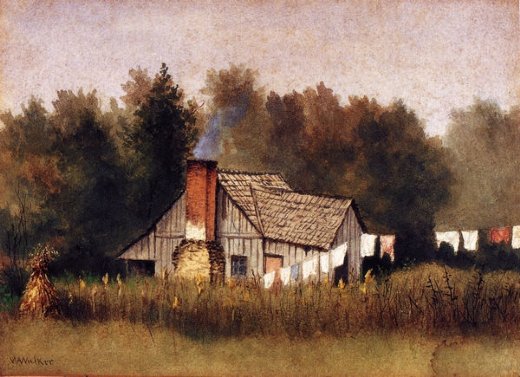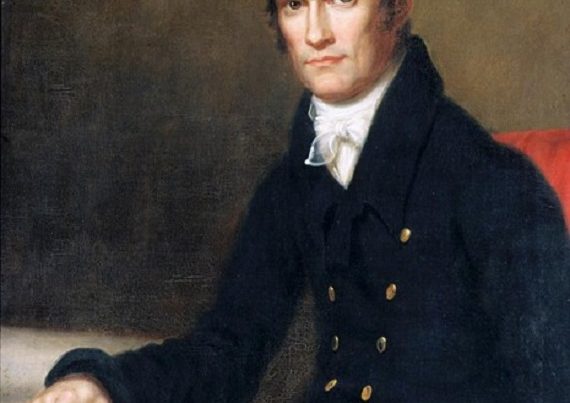In honor of John Taylor’s birthday, December 19.
From Tyranny Unmasked:
“The rival remedy for our troubles, so insignificant in the eyes of the Committee as to be wholly suppressed, although it has been often enforced by a multitude of able writers, and some patriotick [sic] statesmen; and although it was the basis of two federal administrations, which diffused more happiness and prosperity than can be otherwise obtained; is reducible to a few principles, which may be comprised in a few words. Return to frugality, restore free trade, abolish exclusive privileges; retract unjust pensions; surrender legislative patronage; surrender, also, legislative judicial power; and vindicate the inviolability of property . . . .”
“Tyranny is wonderfully ingenious in the art of inventing specious phrases to spread over its nefarious designs, ‘Divine right, kings can do no wrong, parliamentary supremacy, the holy alliance,’ are instances of it in Europe. ‘Common defence [sic], general welfare, federal supremacy and political economy [mercantilism renewed],’ are impressed into the same service here. When the delusion of a phrase is past, another is adopted to work out same ends as its predecessor.”
“We fought in the revolutionary war against exclusive privileges and oppressive monopolies [old mercantilism in support of absolute government].”
“To make them [protecting duties] constitutional, the Committee have adopted the present fashionable mode of construction, which considers the constitution as a lump of fine gold, a small portion of which is so malleable, as to cover the whole mass. By this golden rule for manufacturing the constitution, a particular power given to the Federal Government, may be made to cover all the rights reserved to the people and the States, a limited jurisdiction given to the Federal Courts, is made to cover all the State Courts [Supreme Court decisions, 1816-1823], and a legislative power over ten miles square, is malleated [sic]over the whole of the United States, as a single guinea may be beaten out, so as to cover a whole house.”
“Here, then, a combination of powers is asserted by these self-created guardians of the constitution [the echoes between Congress and the court], which expunges all the limitations thought by by its framers necessary to preserve a free form of government. ‘The only security against this combination of limitation-destroying powers,’ say the Committee, still echoing the supreme court, ‘ is the structure of the Federal Government.’ But neither the court nor the Committee have ventured openly to inform us, whether it lies in the whole structure, or only in some portion of it. Do they consider the State Governments as component parts of this structure, enabled to resist its threatened destruction; or do they believe the Federal to be compounded only of Congress and the supreme court. Whether they admit or reject the State Governments as balancing or checking portions of the structure, they allow that a security against destruction is deposited somewhere . . . . The difficulty [of defining powers] may place the honourable men and real patriots in Congress, in a nice and delicate situation; but, however hard it may be to split straws for the purpose of defining the exact line which limits their powers, it does not follow that they ought to demolish pillars [the states as the foundation of America’s extended republic].”
“But are not the original sovereignties of the States, the reservation of internal rights of sovereignty [and legislation from imperio in imperium within the old British empire], and limitations of the federal constitution, to prevent Congress from making some States tributary to others, powerful auxiliaries to the argument deduced from representation. Was not representation both State and Federal, instituted to prevent fraudulent transfers of property from State to State, and from the people, to exclusive privileges and legal combinations. If representation goes wrong, the possibility of which is contemplated by every free government, some more of correction is necessary. We have provided two; election, and a division of representation between the Federal and State governments, assigned to each distinct and independent powers, and divided the moral rights of representation, that one . . may check the wrongs of the other.”
“The states possessed political powers antecedent to the constitution, as is acknowledged by their reservation. These State political powers, previously possessed, never surrendered and expressly retained, inherently comprised a moral right of self-defence [sic] against every special of aggression; and the constitution instead of saying that they may be taken away by the Fedeal l government, expressly declares that they shall not; that they are without the compass of that instrument, and and not embraced by it at all. Here then is a positive constitutional veto, clearly precluding both Congress and the federal court from touching the reserved State rights.”






